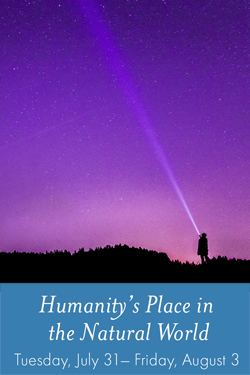HUMANITIES | By Andy Gilman
What is Humanity’s Place in the Natural World?
What is nature? What does natural mean? Or, more specifically, what is natural for humans to do and be in the world, and what is our relationship to the world? Do we belong to the world, are we wholly made of the world, or are we a part of it and also alien to it? What is our responsibility to the world? Are we stewards?
 There are origin stories from around the world that describe our situation as partly of the world and partly not of the world. Here are just three stories, and they are amazingly congruent:
There are origin stories from around the world that describe our situation as partly of the world and partly not of the world. Here are just three stories, and they are amazingly congruent:
Prometheus and Epimetheus were spared imprisonment in Tartarus because they had not fought with their fellow Titans during the war with the Olympians. They were given the task of creating humanity. Prometheus shaped man out of mud, and Athena breathed life into his clay figure. Prometheus had assigned Epimetheus the task of giving the creatures of the earth their various qualities, such as swiftness, cunning, strength, fur, and wings. Unfortunately, by the time he got to humans Epimetheus had given all the good qualities out and there were none left for man. So Prometheus decided to make man stand upright as the gods did and to give him fire. (Greek)
…
In the beginning there was no land, no light, only darkness and the vast waters of Outer Ocean where Earth-Maker and Great-Grandfather were afloat in their canoe… Earth-Maker took soft clay and formed the figure of a man and of a woman, then many men and women, which he dried in the sun and into which he breathed life: they were the First People. (Native American)
…
Now no shrub had yet appeared on the earth and no plant had yet sprung up, for the Lord God had not sent rain on the earth and there was no one to work the ground, but streams came up from the earth and watered the whole surface of the ground. Then the Lord God formed a man from the dust of the ground and breathed into his nostrils the breath of life, and the man became a living being. (Hebrew)
The simple way to read these accounts is that our bodies are made from the same stuff as every other natural thing, such as clay, and the breath of our life comes from supernatural forces that created and govern the world. Even in comparison to the animals, of which at least our bodies have so much in common, humans are particularly situated not just with life but also with a god-like fashioning. Other aspects of these peculiarities include morality, language, abstraction, timing, calculation, imagination, understanding… in short, what reason produces. Some would argue that this is why we don’t feel completely at home in the natural world.
Further, in religions and philosophies that involve an afterlife, the world is often considered a testing ground, and humanity’s performance during the test will determine what will happen in the next phase. Sometimes the next phase is coming back to the world to be tested again, an example of this system being the karmic cycles in Hinduism or in Buddhism. But just as in the final-resting-place type of afterlife, the karmic cycle can end in a final destination of non-existence when all goes well (Nirvana).
So, within this framework of losing the self or maintaining the self in something like heaven, the world is not our true home… it’s our temporary home, just as our body would be our temporary suit. Within these beliefs, the breath of life (or the spark of human consciousness) given by the creating powers is our real self, or at least the self or essence or quality that will endure for the next or final phase.
And yet, we are increasingly seeing that an absence of being in nature is having a profoundly negative effect on human psychology, with advocates calling for more regular environmental exposure and availability. Further, we are finding more that animals do exhibit modest traits thought to be exclusively human. So, where do we belong? What is natural and beneficial for us, and what is our role in the natural world? This four-day great books intensive will look at these questions from multiple perspectives and modalities. Readings will include selections from Lucretius, Bacon, Emerson, Thoreau, Jonas, and Oliver. There will also be lectures, nature walks, astronomy, a panel with Ojai’s environmental nonprofits, and more.
The tuition is $800, which includes all meals, texts, seminars, lectures, and nature walks. Lodging is not included. Book discounted rooms directly with The Ojai Retreat by calling (805) 646 –2536 or emailing info@ojairetreat.com.
www.agorafoundation.org to register.

Leave A Comment